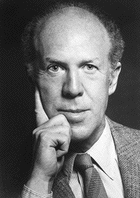| Profile | Major Works | Resources |
Gérard Debreu, 1921-2004


It is difficult to underestimate the luminous shadow cast by Gérard Debreu over Neo-Walrasian general equilibrium theory. For many years, Debreu has set the standard as well as posed most of the questions (and, in many cases, provided many of the solutions) that were to be addressed by mathematical economics - an achievement paralleled only by his intellectual brother-in-arms Kenneth J. Arrow.
Debreu learnt his mathematics at the Bourbakist Ecole Normale Superieure and his economics from the works of Maurice Allais. He later became one of the most prominent and active inmates at the Cowles Commission before moving to Berkeley in 1962. Debreu's terse masterpiece, The Theory of Value (1959) remains the definitive statement of Neo-Walrasian theory in its purest, axiomatic form.
Debreu's output may have been relatively sparse, but each one of his contributions have been prodigious. He independently discovered the proofs for the First and Second Welfare theorems (1951, 1954) and rigorously derived the conditions under which a utility function can represent a preference ordering (1954). With K.J.Arrow, Debreu provided one of the first simple proofs of existence of a competitive equilibrium (1954). He also developed the first proof that the set of equilibria are finite and thus that equilibria are locally unique (1970).
Equally fundamental, Debreu developed (with Herbert Scarf) the famous theorem on "core convergence" in a replicated economy (1962, 1963), provided tools for other more general core convergence theorems (e.g. 1967) and was one of the first to determine the rate of that convergence (1975).
Debreu also opened many conceptual pathways for later researchers: he introduced the concept of a "quasi-equilibrium" (1962), the idea that a bundle of goods and their prices may be represented as a linear space and its dual (1954), integrated the concept of uncertainty into G.E. via state-contingent commodities (1959), developed the idea of "neighoring agents" as representable by the topology on a measure space (1969), defined the concept of "smooth preferences" which permitted the re-introduction of the differential calculus into mathematical economics (1972), as well as undertook the first venture into infinite-dimensional commodity spaces (1954). One of his better known pieces of work is that on market demand functions (1974), which yielded the famously destructive Debreu-Sonnenschein-Mantel theorem.
The full depth and impact of his work is difficult to assess much less summarize adequately. A survey of some of Debreu's major achievements can be found in the linked survey of Walrasian General Equilibrium Theory. The Nobel Prize committee referred to his entire life's work, with the Theory of Value (1959) underlined in particular, in awarding Gerard Debreu a Nobel Memorial Prize in 1983. He has taught at the University of California at Berkeley for most of his career.
|
Major Works of Gerard Debreu
|
|
HET
|
|
Resources on Gerard Debreu
|
All rights reserved, Gonçalo L. Fonseca
